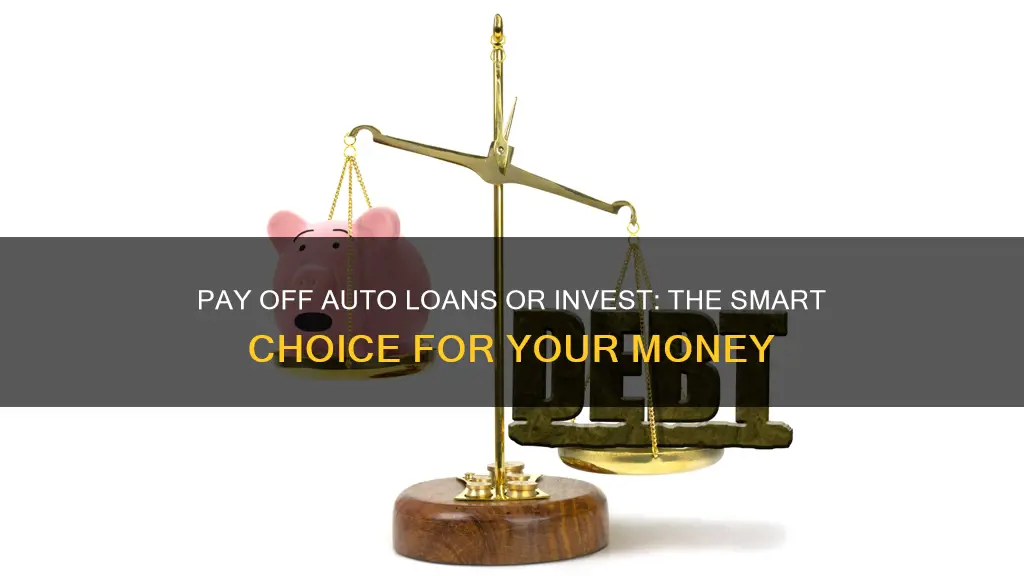
Whether you should pay off your auto loan before investing depends on a number of factors, including your financial situation, interest rates, and future plans. Here are some key points to consider:
- Interest Rates: Compare the interest rate on your auto loan to the potential returns on your investments. If your auto loan interest rate is higher than what you could earn by investing, it may be wise to pay off the loan first.
- Financial Situation: Assess your overall financial situation. If you have high-interest debt, such as credit card debt, it may be more beneficial to focus on paying that off first. Additionally, consider your savings and emergency funds. Building an emergency fund and saving for retirement should be priorities alongside debt repayment.
- Future Plans: If you're planning a big purchase, such as a home, maintaining a diverse credit mix could be important. Paying off your auto loan early could lower your credit score, so consider your short-term and long-term financial goals.
- Prepayment Penalties: Some lenders charge prepayment penalties for paying off a loan early. Calculate whether the interest savings outweigh any penalties you may incur.
- Debt-to-Income Ratio: Paying off your auto loan early can improve your debt-to-income ratio, making it easier to secure future loans at lower rates.
- Peace of Mind: Fully owning your vehicle can provide a sense of security and satisfaction. It also gives you more flexibility if you decide to sell or trade in your car.
| Characteristics | Values |
|---|---|
| Interest saved | Paying off your car loan early can save you money on interest. |
| Debt-to-income ratio | Paying off your car loan early can lower your debt-to-income ratio, which can help you qualify for better credit in the future. |
| Ownership | Paying off your car loan early gives you full ownership of your vehicle, which can be useful if you need to sell it. |
| Credit score | Paying off your car loan early may cause a slight decrease in your credit score, but this should be temporary. |
| Prepayment penalties | Some lenders charge a fee for repaying your loan early, known as a prepayment penalty. |
| Other debt | If you have other high-interest debt, such as credit card debt, it may be more advantageous to pay this off first. |
| Emergency fund | It is generally recommended to have an emergency fund of three to six months' worth of expenses before paying off your car loan early. |
| Investment | If the interest rate on your car loan is low, it may be more beneficial to invest your money instead, especially if you can get a higher rate of return on your investments than the interest rate on your car loan. |
What You'll Learn

Weigh up the interest rates of your auto loan vs. your investments
Weighing up the interest rates of your auto loan against your potential investments is a key consideration when deciding whether to pay off your auto loan early.
If your auto loan has a high interest rate, it is likely to be costing you a significant amount of money, and paying it off early could save you a substantial sum. On the other hand, if your auto loan has a low interest rate, you may be better off investing your money elsewhere, as you may be able to earn a higher rate of return on your investments than you are paying in interest on your auto loan.
For example, if you have credit card debt, you will likely be paying a higher rate of interest on this than you are on your auto loan. In this case, it would make financial sense to prioritise paying off your credit card debt over your auto loan, as you will be reducing the amount of interest you pay overall. Similarly, if you are investing in the stock market and earning a higher rate of return than the interest on your auto loan, it may be more beneficial for you to continue investing rather than paying off your auto loan early.
However, it's important to remember that investing in the stock market comes with risks, as there are no guarantees that you will always earn a positive rate of return. In contrast, paying off an auto loan early provides the security of knowing exactly how much money you will save in interest.
Additionally, paying off an auto loan early can have other benefits, such as improving your debt-to-income ratio and giving you full ownership of your vehicle, which can be helpful if you want to sell it.
Therefore, when deciding whether to pay off your auto loan early, it's crucial to consider not only the interest rates of your auto loan vs. your investments but also your financial goals, risk tolerance, and the potential benefits and drawbacks of each option.
Salem's Investment: Town Secrets
You may want to see also

Consider the impact on your credit score
Paying off your car loan early can cause a slight, temporary dip in your credit score. This is because open, positive credit accounts have a greater impact on your credit score than closed ones. Lenders want to see how well you are managing your debt payments now, not in the past.
Your credit score takes several factors into consideration, such as:
- Payment history: Making consecutive, on-time payments on loans and credit cards makes up 35% of your credit score. Paying off a car loan early closes the account completely, which may work against your positive payment history.
- Credit utilisation: The ratio of the amount you owe to the total credit limit of your accounts, factoring in how much you owe on your car loan, accounts for 30% of your credit score. Paying a loan off early changes your utilisation ratio.
- Credit history: The age and length of time you’ve had open credit accounts make up 15% of your credit score. Once a car loan is paid in full, the account will “fall off” and change the average age of your overall credit, impacting your score.
- Type of accounts: Your range of credit accounts or “credit mix” accounts for 10% of your credit score. Car loans are instalment loans, which are different from credit cards (revolving credit).
- Number of hard inquiries: This shows the number of times you’ve tried to apply for a new credit card or open a new line of credit, which accounts for 10% of your credit score.
If you are trying to establish credit or improve your credit score, keeping a car loan open could be more helpful than paying it off early. A car loan can add to the number of accounts you have, helping to build your credit history and improve your credit mix.
However, there are times when paying off your car loan early is the right decision. For example, if you have a high-interest car loan, you can save money by paying it off early. Additionally, if you are applying for a mortgage loan and need to lower your debt-to-income ratio to get approved or qualify for a lower interest rate, paying off your car loan early could improve your chances.
ETFs: Invest Now or Later?
You may want to see also

Assess your financial priorities and goals
When deciding whether to pay off an auto loan early or invest, it's important to assess your financial priorities and goals. Here are some key considerations:
Short-Term and Long-Term Goals
It's essential to strike a balance between short-term and long-term financial goals. Paying off an auto loan early can provide immediate benefits, such as reducing the total interest paid and lowering monthly payments. On the other hand, investing early in your life can significantly impact your long-term financial goals, especially for retirement. Consider your time horizon for different objectives and how each option aligns with your short-term and long-term plans.
Interest Rates and Returns
Interest rates play a crucial role in your decision-making process. Compare the interest rate on your auto loan with potential investment returns. If your auto loan has a high-interest rate, paying it off early can save you a significant amount in interest charges. However, if you have the opportunity to invest in vehicles with higher potential returns than the interest rate on your auto loan, investing may be more advantageous.
Debt Management
Evaluate your overall debt situation. If you have high-interest credit card debt or other consumer loans with higher interest rates, focus on paying off those debts first. Credit card debt, for example, typically carries much higher interest rates than auto loans, and it's crucial to eliminate those high-interest obligations as quickly as possible. Ensure you're not just shifting focus to your auto loan while ignoring other more costly debts.
Emergency Funds and Savings
Before committing to paying off your auto loan early or investing, ensure you have adequate emergency savings. Financial experts generally recommend having three to six months' worth of living expenses set aside in case of unexpected events, such as job loss or medical emergencies. Building a solid emergency fund can provide a safety net and help you avoid taking on additional debt during challenging times.
Credit Score Impact
Consider the potential impact on your credit score. Paying off an auto loan early may lead to a slight decrease in your credit score due to changes in your credit mix. However, this effect is usually temporary, and your score should recover within a few months if you continue to manage your credit responsibly. Weigh the benefits of paying off the loan early against the potential short-term dip in your credit score.
Risk Tolerance and Peace of Mind
Everyone has a different risk tolerance level. Some people prefer the peace of mind that comes with being debt-free, while others are comfortable carrying debt if it means having more funds available for investing. Assess your risk tolerance and how comfortable you are with different options.
In conclusion, assessing your financial priorities and goals is crucial when deciding whether to pay off an auto loan early or invest. Consider your short-term and long-term goals, interest rates, debt situation, emergency savings, credit score, and risk tolerance. Striking a balance between these factors will help you make a well-informed decision that aligns with your financial objectives.
Amaravati: Invest Now or Never?
You may want to see also

Understand the pros and cons of paying off your auto loan early
There are several advantages to paying off your auto loan early. However, it is important to consider the potential disadvantages before making a decision. Here are some pros and cons to help you understand the implications of paying off your auto loan early:
Pros:
- Save on interest: Paying off your auto loan early can result in significant savings on interest costs. The interest amount is calculated based on the loan principal balance, so paying off the loan earlier will reduce the total interest paid over the loan's lifespan.
- Reduce your risk of negative equity: Cars depreciate over time, and high-interest rates or low equity can lead to a situation where you owe more than the car's value. Paying off the loan early mitigates this risk.
- Full ownership: Paying off the loan early means you gain full ownership of the vehicle. This gives you more flexibility if you decide to sell or trade-in the car, and you can also choose your insurance coverage limits without lender requirements.
- Improved debt-to-income ratio: Paying off the auto loan will reduce your debt-to-income ratio, making it easier to get approved for other loans, such as a home mortgage, and potentially qualifying you for lower interest rates.
- More money for monthly bills: Paying off the loan early frees up funds that were previously allocated for monthly car payments, allowing you to use the money for other expenses or savings.
Cons:
- Prepayment penalties: Some lenders charge prepayment penalties or fees for repaying the loan early, as they expect to receive a certain amount of interest. These penalties can offset the savings you would otherwise make by paying off the loan early.
- Temporary dip in credit score: Paying off the loan early may lead to a slight decrease in your credit score, especially if the auto loan was your only instalment loan. This is because your credit score considers your credit mix, and removing the auto loan from the equation can impact your score temporarily.
- Better uses for your money: If you have other high-interest debt, such as credit card balances or personal loans, it might be more beneficial to use your money to pay off those debts first. Additionally, consider building an emergency fund or investing in retirement funds before paying off the auto loan early.
- Budget constraints: Paying off the loan early might strain your budget, especially if you don't have sufficient savings or if unexpected expenses arise. It's important to ensure that paying off the loan early doesn't put you in a financially precarious situation.
Calculating Investment Returns: A Comprehensive Guide
You may want to see also

Explore strategies for paying off your auto loan early
If you want to pay off your auto loan early, there are several strategies you can use. Here are some options to consider:
- Refinance your auto loan: Refinancing your auto loan means taking out a new loan with more favourable terms, such as a lower interest rate or shorter repayment term. This can help you pay off your loan faster and save on interest charges. However, be mindful of any upfront fees associated with refinancing.
- Make biweekly payments: Instead of making one full payment per month, pay half the amount every two weeks. This will result in 13 full payments per year instead of 12, helping you pay off your loan faster and reducing the interest accrued.
- Round up your payments: Consider rounding up your monthly payments to the nearest $50 or $100. For example, if your car loan payment is $365 per month, round it up to $400. This extra amount will help chip away at your remaining balance faster.
- Make a lump-sum payment: If you receive a windfall, such as a tax refund or work bonus, consider putting it towards your auto loan. This will significantly reduce your principal balance, lowering the total amount you owe and the interest charged.
- Opt-out of unnecessary add-ons: Review your loan agreement for any optional add-ons, such as extended warranties or service contracts. Cancelling these can result in a prorated refund, which you can then put towards paying down your loan.
Before implementing these strategies, it's important to consider your financial situation and ensure that paying off your auto loan early aligns with your financial goals. There may be disadvantages to paying off your loan early, such as prepayment penalties or a temporary decrease in your credit score. Additionally, if you have other high-interest debt, it may be more beneficial to focus on paying that off first.
Gamestop Investors: Who's In?
You may want to see also
Frequently asked questions
Yes, it is generally recommended to pay off high-interest debt first. Credit cards tend to have higher interest rates than auto loans, so it may be more beneficial to pay off credit card debt before paying off your auto loan early.
Paying off your auto loan early can save you money on interest and improve your debt-to-income ratio. It can also give you full ownership of your vehicle, which can be useful if you want to sell it.
Paying off your auto loan early may result in a temporary dip in your credit score, especially if it is your only installment loan. Additionally, some lenders charge prepayment penalties, so you may end up paying more overall.
There are several ways to pay off your auto loan early, including making a lump-sum payment, increasing your monthly payments, or making biweekly payments.







